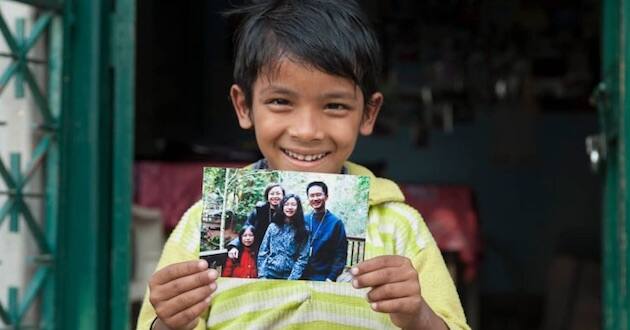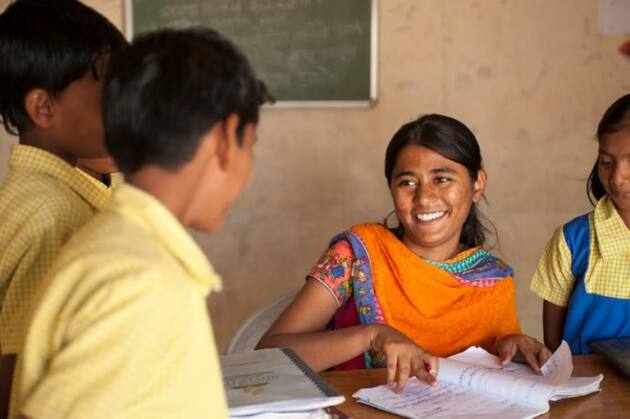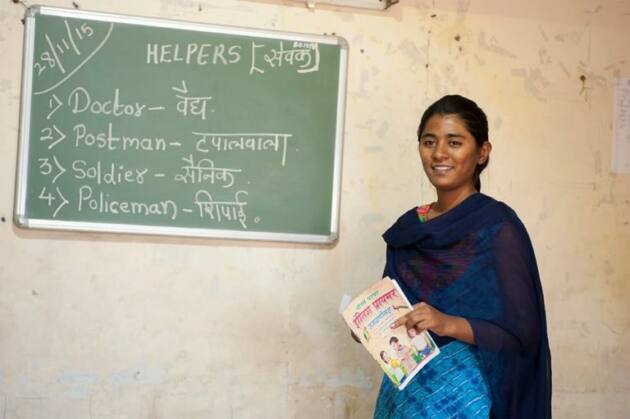Report: Lasting impact from supporting child living in poverty

A child in poverty who is sponsored by someone from a Western country is up to 80 percent more likely to graduate from college, a new report from Gospel for Asia found.
“When children in abject poverty have no prospect of going to school, their dreams are crushed and they have no hope of escaping the generational poverty trap,” said K.P. Yohannan, who founded the ministry.
Research conducted in six developing countries over a two-year period suggests the sponsor-a-child model adopted by many leading nonprofit organizations makes “significant impacts” on sponsored children’s education, health, well-being and aspirations. Researchers from the University of San Francisco and University of Minnesota found sponsored children in South Asia, Africa and Latin America stayed in school longer, were much more likely to complete high school and were more likely to graduate from college.
Sponsored children — most of them supported by donors in the United States, Canada and other Western countries — show “higher levels of self-esteem, aspirations and self-expectations, and lower levels of hopelessness,” according to the report
“Child sponsorship provides the opportunity to go to school, receive basic health care, and have clean water, meeting whatever needs the child’s community might have,” he said. “It turns utter despair to remarkable hope. Many sponsored children grow up to be teachers, nurses and even doctors.”
Sponsored children — most of them supported by donors in the United States, Canada and other Western countries — show “higher levels of self-esteem, aspirations and self-expectations, and lower levels of hopelessness,” according to the report.

While in many cultures, non-college-educated individuals can make excellent wages, in many developing economies, good paying manual labor jobs are non-existent. College degrees allow formerly-sponsored children to make the wages necessary to support their families back home and, more importantly, fundamentally change the culture in their communities.
For thousands of children such as Bir, a boy who used to scavenge in trash piles to survive, and Divena, a 5-year-old girl abandoned by her mother, when a sponsor steps up, it speaks to their hearts, showing them “they’re created for a higher purpose and that God really loves them,” Yohannan said.
Gospel for Asia donors have helped support 142,000 children across South Asia, and the organization aims to sponsor 500,000 children worldwide by 2030. “Millions of children living on the streets and in slums today is truly heartbreaking,” Yohannan said. “We must rescue them and give them hope in Christ’s name.”
But it’s not just GFA. About two years ago, Compassion International joined the billion-dollar charity club. That put it alongside such noted names as United Way, Salvation Army, the Red Cross and the YMCA. Its 2020 fiscal year income topped that mark by $1.2 million, growing 4 percent over the previous year despite its major spring fundraising initiative getting canceled because of COVID-191.
A key element of this news is Compassion’s status as one of the best-known organizations built on child sponsorship, a valuable component of lifting children out of poverty worldwide. Sponsors help provide kids with such opportunities as education, medical care, protection against malnutrition, and clean water. That such purposes resonate with donors is demonstrated by the Colorado Springs-based ministry’s record of 21 years of consecutive growth.

“Our sustained growth is a testament to our faithful supporters who are committed to the work we are called to do in releasing children from poverty in Jesus’ name,” Controller and Vice President of Finance Amanda Whitmire told the city’s Gazette newspaper. “[It is also] our ability to continue that work with increasing effectiveness and efficiency through our workforce and dedicated church partners.”
While groups like Compassion offer one-on-one matches between a sponsor and a child, others put donations to work through community development. Some organizations utilize other methods, but no matter how the money is used, child sponsorship is purported to offer children a chance to escape the cycle of poverty that can trap people for a lifetime. (One recent estimate places the number of sponsored children worldwide at 10 million.4)
According to the World Bank, 53 percent of children living in low- and middle-income nation are classified as “in-school non-learners,” meaning they are enrolled in school but do not retain the things they learn.5 The agency found that children in this group cannot read or comprehend a short, age-appropriate story by the time they finish grade school. In poorer countries, the agency says the number can range as high as 80 percent.6 What’s worse, those who fail to finish school can easily join the ranks of the world’s 160 million child laborers.7
This was the kind of bleak situation facing a boy in South Asia named Neale not too long ago. The eight-year-old lives in a rural mountain village with his parents, who are employed in the area’s fertile tea fields. Their meager earnings aren’t enough to cover necessities, meaning Neale sometimes doesn’t have bus fare to make it to school. Because of sporadic attendance, his grades were dropping. This was devastating for the boy as a good education would be instrumental for him to be able to one day get a good job and be able to fulfill his dream of helping his mother.8
That’s when one of Neale’s teachers, who had noticed his situation, showed up at his home to tell him about a way to receive tutoring. The solution: a child sponsorship program operated by GFA, a non-governmental organization that operates in Asia and Africa. It meant Neale could receive the attention and time he needed to thrive. The following week, Neale sat with dozens of children like him listening to their tutor. After school, child sponsorship staff helped reinforce the lessons and helped him complete assignments.
“Neale also received a nutritious meal, tips on proper hygiene and school supplies—greatly relieving his mother of additional financial expenses,” Gospel for Asia (GFA World) reported. “The staff saw to his every need, wanting to help Neale achieve his dream. They offered all sorts of guidance, instilling within him the discipline he needed to advance his education and grow as an individual. Little by little, as Neale’s grades rose, so did his hope. That good job he wanted didn’t seem so distant now; helping his mother didn’t seem so impossible now.”9
This is a key attraction for sponsors; such programs afford them the opportunity to help desperately needy children who otherwise face a bleak future. In its materials, Compassion International outlines a variety of benefits, beginning with holistic child development that blends physical, social, economic and spiritual care to help each child fully mature. Thousands of churches in low- and middle-income nations tailor this model to the contextualized needs of the children in their community.
Other benefits the ministry lists include the opportunity to hear the gospel, better health, better nutrition, education and vocational support, safety and protection, and socio-emotional development.10 Plus, personal correspondence; in 2020, Compassion translated and sent 4.9 million letters from sponsored children to U.S. sponsors. Spokesperson Tim Glenn says the ministry’s growth is “a testimony of the power of relationship. The relationship between sponsor and child, the relationship between our ministry and our church partners, and of course, the relationship between God and his people.”11
More information is available at www.gfa.org
–Dwight Widaman with MissionsBox | MV









